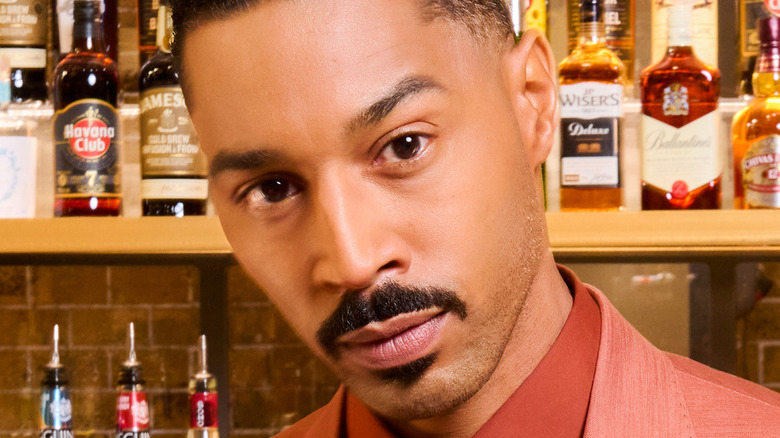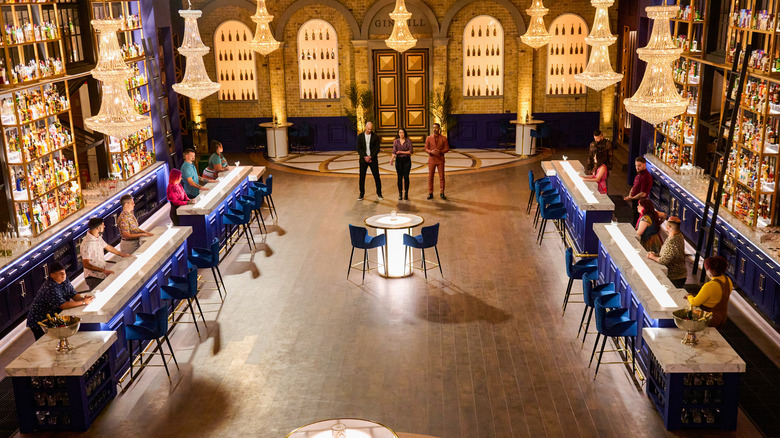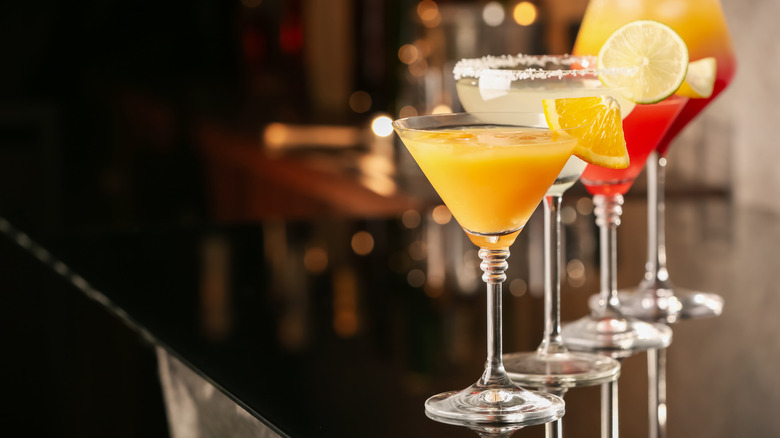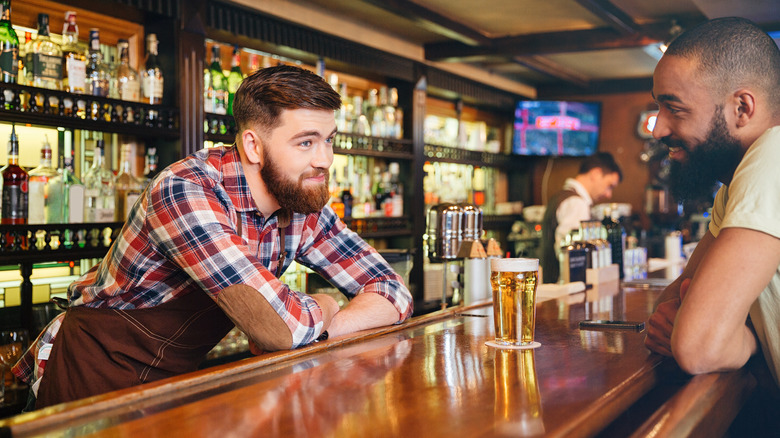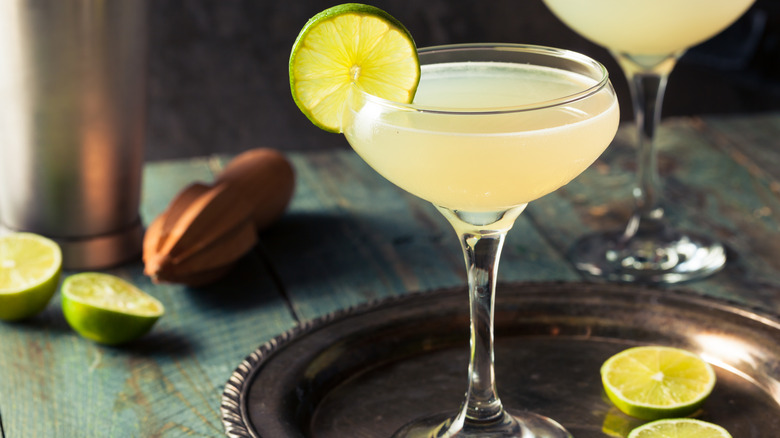New Competition Series Drink Masters Will Showcase A Culinary Approach To Drinks - Exclusive Interview
Creating the perfect drink has become a type of liquid art for mixologists, who spend years honing their craft. Netflix is now giving 12 talented bartenders from around the world the chance to showcase their culinary approach to cocktails on "Drink Masters." In the trailer, one contestant explains they use a lot of wild ingredients, which is followed by images of the spiky Southeast Asian fruit durian and other unique-looking alcohol creations.
The new series debuts October 28 and will feature participants going head-to-head each episode to create the most delicious bevy. Whoever is able to consistently impress the judges will ultimately be crowned Drink Master and will also receive a life-changing prize. We spoke to the host of the show, comedian Tone Bell, and mixologist competitors Kate Gerwin and Lauren "LP" Paylor O'Brien to find out more about what viewers can expect to see this season. They also revealed how the intense pressure of the show brought some of them to tears and caused some friction among castmates.
What kind of challenges the bartenders will compete in
Can you guys tell me what we can expect for this new series, "Drink Masters"?
Tone Bell: You're going to see something that you've never seen before, which is a cocktail competition show. There's going to be some tears and some drama, and some laughter, but it all surrounds the talents of our 12 unbelievable contestants and turning all this to liquid art. It's going to be amazing.
What kind of challenges does the show have?
Lauren O'Brien: I don't want to give too much away, but it certainly tests our ability to execute cocktails in many different scenarios. [It] tests our ability to work under pressure and our knowledge of classic cocktails and deviating from that, as well as the incorporation of some molecular gastronomy.
Was there anything that happened that surprised you during the season?
Kate Gerwin: The pressure was way more than I expected. It was very emotional. It was exhausting and draining, and after every day doing this over and over again, it really does wear on you, and your emotions are high. I cried a lot, more than even usual. We also made good friends and lifelong friendships, and we got to inspire each other. ... It wasn't just about making drinks; it was highlighting people's different talents. The pressure was intense.
What was the most innovative drink that someone created?
O'Brien: I don't think there's one that stands out in particular for me. I will say that [for] every episode I saw, I was privileged and honored to be able to see what everyone did, and every time they did something else, I was like, "Oh my gosh." It was amazing to see how we each respectively continue to push our boundaries and our limits. That growth for us personally, but also collectively, was really cool to see as we progressed from episode to episode.
Bell: It was real cool hosting and watching from afar [and] also watching individual styles of how everybody works, and there are a few challenges where they break off into groups. Watching all these individuals have to work together, it's some turmoil. It either works or it doesn't. Occasionally, they work together, and then that's, "Who's quarterbacking this thing? Who's going be the receiver?" It gets a little dicey every now and then.
What is the life-changing prize that contestants can win?
Bell: If you make it through all the episodes and you are crowned Drink Master, you will win $100,000.
What components do you think make the best cocktail? I know that's probably tough because there are so many great ones.
Gerwin: Balance is key for all of us, and the unique thing about flavor is that it's subjective. Everyone has a different flavor profile or something that they gravitate to, depending on their age, depending even on their sex, depending on their culture, how they were raised, what foods they're used to eating, and there's also [an] actual biological [component to] if they don't like cilantro or this or that. The thing that makes it so exciting is that there's so many factors in finding that sweet spot for the general public, and trying to achieve unique, creative cocktails is a huge journey.
Common misconceptions about bartenders
I tried to create my own fancy cocktail during the pandemic, as I think many people did. It turned out terrible, and it gave me a whole new appreciation for how difficult that is. What are some misconceptions people have about mixologists or how difficult it is to make a great cocktail?
O'Brien: We spend a lot of time learning. We put a lot of work into ensuring ... There are several certifications people can get and plenty of classes that we can take, and I can certainly say that folks in our sector work really hard to ensure that they're very good at what they do. There are certain steps that need to be taken to craft certain drinks, but we're always happy to share that knowledge. The show in and of itself is a great opportunity to showcase how complex and nuanced it can be and how versatile it is, how exciting it is, and sometimes in situations, how hard it can be.
Do you think that viewers will get a better sense of what components make an amazing mixed drink and learn to do it on their own?
O'Brien: For sure, I think so. I'm hoping that, the same way we saw people making bread during COVID, folks are going to be encouraged to make drinks at home.
Who is the one person you'd want to make you a cocktail?
Bell: Probably Morgan Freeman. I feel like he'd be talking while he's doing it, and then it would sound wonderfully velvety.
Gerwin: I want Michelle Obama to make me a drink so I can sit there and be like, "Amazing, and tell me all the things that make all the things perfect." ...
You get advice from your bartender. That's why I'd be like, "Okay, girl, we got to talk."
Why customers open up to their bartenders
What do you think makes people feel safe about divulging things to a bartender?
O'Brien: The same way it is when you go to the hairdresser or you're getting your nails done, it's like they're taking care of a part and aspect of you. They're making you feel good, fulfilled, full. It's funny, because it doesn't stop with the drink that we serve you. It really is about how we make you feel, the comfortability aspect. You're coming to our bar. You could sit at home and make yourself a drink. It's a full experience, and it's kind of magical when you think about it that way.
Has there been any advice or therapy-type sessions you feel like you've had with somebody who's come into your bar or that you've met?
Gerwin: All the time. People go to bars to be social. You could drink at home. [You go to the bar in] times of celebration [and] times of grief. [If] you need someone to talk to [or] you're having a bad day, you go to the bar to be picked up. If you're celebrating, you go to the bar to help celebrate, to celebrate with other people. And as bartenders, it's our job to evaluate that situation and be the best friend that we can be to that person at the bar.
Alcohol's also a little bit of social lubricant. Some people are uncomfortable sharing or divulging, and they come to relax and have a drink, and they feel more comfortable and more open. It's a vulnerable position to be able to share your emotions with someone.
What's one ingredient you could never live without as a mixologist?
O'Brien: Sherry — fortified wine that comes from Jerez, which is the southernmost part of Spain. It's so different. It can be really mineral-driven or forward. It can be pretty nut forward and sweet. I want that in every drink that I make.
What cocktails are known for that?
O'Brien: Bamboo cocktail, which is a variation of martini. We can make an old fashion that has a really beautiful dessert sherry in it. Sherry flip, [which] has a whole egg, a dessert-style drink.
Mixologist reveals their own favorite cocktail order
What's your go-to cocktail and at which bar?
Gerwin: My go-to cocktail for a new bartender is a daiquiri. It's a simple three-ingredient cocktail, which shows me if they understand balance. You have to balance. You still want to taste the spirit, sugar, and citrus balance each other out because of the acidity and the sugar levels. To me, taking something [as] simplistic as a daiquiri and making sure the bartender can make all of those three ingredients still shine — one can't outshine the other — is the mark of someone who knows their craft.
Is there one particular bar you like going to?
Gerwin: If we're talking daiquiris, I'm going to Cafe La Trova in Miami and bellying up and asking Julio, the god of daiquiris, to make me one. A hand-shaken daiquiri is an act of beauty, and it's an art form. The frozen daiquiris are something that morphed out of drinking culture in the '80s and '90s, but a true daiquiri is a beautiful cocktail.
Is there anything else you want to say or add about the show that you think is important or that people should know?
Gerwin: I think it's time for the bartending industry and profession itself to be seen for what it is. We take a lot of pride in what we do. We study; we learn; we care about hospitality. We care, as we're very empathetic people. We want our guests to have a good time, and we love what we do. It's not something that we're doing to pass the time until that other career happens. This is it. This is the end goal for us, and I think people are going to see how great our industry really is.
The new series "Drink Masters" premieres on Netflix on October 28.
This interview has been edited for clarity.
